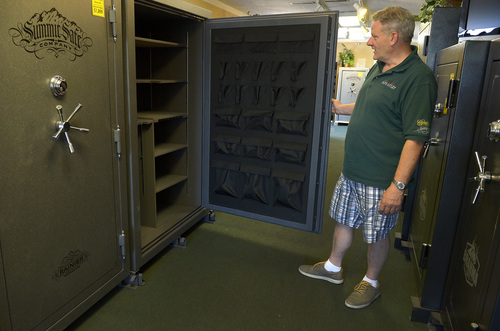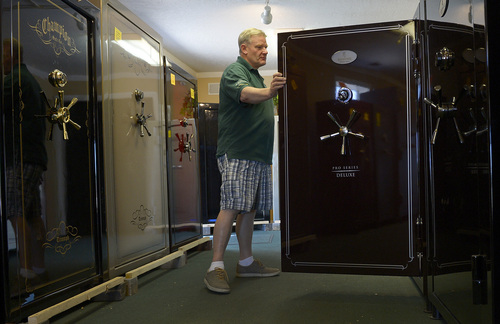This is an archived article that was published on sltrib.com in 2014, and information in the article may be outdated. It is provided only for personal research purposes and may not be reprinted.
Another 54 bills from this year's Legislature took effect Tuesday — ranging from a new suicide-prevention program that provides free gun locks and rebates for gun safes to reining in force used in police raids because of two well-publicized raids that went badly.
They were among 457 bills the Legislature passed this year and that Gov. Gary Herbert either signed or allowed to become law without his signature.
Most took effect on May 12, 60 days after the Legislature adjourned. But others — many of them budget and appropriations measures — kicked in Tuesday, when the state's fiscal year begins. Some general legislation also became effective, giving state agencies a little extra time to gear up for changes.
The following is a look at some of the more interesting new laws that took effect Tuesday:
—
Guns • HB134 creates a program aimed at preventing suicides that includes offering free cable-style gun locks, and rebate vouchers for between $10 and $200 for buying gun safes.
Rep. Steve Eliason, R-Sandy, said the Utah Shooting Sports Council is partnering with the state to provide some of the gun locks, and the state will buy others with money from concealed-carry permits. The program also creates pamphlets on topics such as safe gun storage and helping to prevent suicides.
The law calls for distributing literature and locks to groups that teach gun safety, suicide-prevention groups, health-care professionals and school districts for use in previously required parent seminars on youth protection.
HB134 also calls for gun-safe rebate certificates to be mailed to people who apply for concealed-carry permits, and to be advertised to all federally licensed firearms dealers in the state.
Eliason testified earlier this year that Utah ranks fifth in the nation in youth suicides and that, as of 2011, 45 percent of suicides are committed with firearms. He said while lawmakers cannot alter many factors affecting suicide, they can work on gun safety.
He said Tuesday, "We're not in any way trying to restrict anyone's gun ownership. The bill is trying simply to promote responsible storage."
—
Police raids • HB70 requires police in most cases to identify themselves when they enter a home.
It still allows no-knock warrants if a magistrate believes it is likely that evidence could be destroyed or lives would be seriously threatened by giving notice. The law also requires police to use the least amount of force possible.
It came about after a high-profile drug raid on the Ogden residence of Matthew David Stewart. That police action resulted in a fierce gun battle that left an officer dead and five wounded. Stewart later hanged himself in jail awaiting trial.
Stewart had asserted that he grabbed a gun when he heard someone breaking into his home, and assumed they were bad guys.
HB70 also requires police to take extra steps to ensure they are raiding the correct house.
Last February, when the Legislature was in session, Salt Lake City paid a $75,000 settlement to a 76-year-old homeowner more than a year after her door was rammed open by narcotics officers who then pointed guns at her. It turned out police had the wrong house — next door to the one where suspected drug dealing was taking place.
—
Other new laws:
Cannabis oil • HB105 will allow Utahns with epilepsy to have trial access to a marijuana extract for treatment. The highly publicized legislation was called Charlee's law, in honor of 6-year-old Charlee Nelson, who may have benefitted from cannabis oil.
She watched the bill pass, but died days later.
Families will be eligible to apply for a Utah "hemp supplement" registration card starting July 8
Cellphone privacy • HB128 requires law enforcement officers to get a judge to issue a warrant before they collect location data from individuals' cellphones. It does allow police some exemptions, such as using location-tracking data in emergencies such as in search-and-rescue operations.
AP tests • SB140 allows giving financial help to high school students who cannot afford to take Advanced Placement test for college credit.
Rep. Ronda Menlove, R-Garland, House sponsor of the bill, said in debate that "allows access to AP tests to some students who may not take that test after rigorous course of study" for lack of money.
Beer tax • HB40 started out as a tax on all alcoholic beverages, then only on beer, then contained no tax hike at all after opposition.
After amendments, only a faint foamy whiff of the bill's secondary purpose remained and took effect Tuesday.
It now merely informs local governments — which receive 40 percent of the state beer tax — of the Legislature's intent to use the money to "fund a balanced approach" to reduce substance abuse, binge drinking and underage drinking. It contains no mandates.







